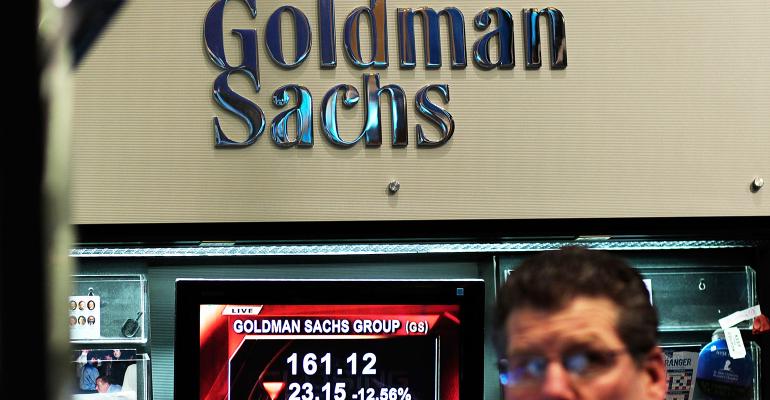(Bloomberg) -- It’s called “Honest Conversations.”
A financial adviser walks a client through a series of probing multiple choice questions about values. The point of the goal-identification exercise is for clients to discover their “Money Mind.” The process is -- according to Goldman Sachs Group Inc. -- “the first step in leading the life you want.”
Wall Street’s most formidable investment bank isn’t known for touchy-feely patter, let alone life coaching, but times are changing. When Goldman bought registered investment adviser United Capital in 2019 for $750 million it was a clear sign of the bank’s intentions of broadening revenue beyond the traditional pillars of trading and dealmaking.
While stock trading helped the bank achieve its highest quarterly profit in a decade last quarter, executives warned in a call with analysts the boom times may not last. Meanwhile, revenue at its consumer and wealth-management division, with its comparatively steady fee-based cash flow, was up 15% from the year before.
While Goldman already offered wealth-management services to ultra-high-net-worth folks, the purchase of United, which was founded in 2005 by Spanish-born, Zimbabwe-raised entrepreneur Joe Duran, gave it an instant footprint in the so-called mass affluent market. Mostly made up of Main Streeters, it was a crowd to whom the name Goldman Sachs risked dredging up memories of the 2008 financial crisis, an association the bank is actively trying to dispel as it pushes further into the consciousness of everyday Americans. Its consumer arm, Marcus, sells loans, savings accounts and credit cards and plans to start offering checking accounts later this year.
Read more: A Goldman Partner’s Odyssey From Karachi to Wooing America
Now re-branded Goldman Sachs Personal Financial Management, the former United has a network of 358 advisers overseeing 21,900 clients, according to Investor.com. On average, those clients entrust them with $1.3 million, giving the division total assets under management of about $27.6 billion. It also has FinLife, a digital client-management system it sells to registered investment advisers. At the time of Goldman’s purchase, United had 220 advisers and $25 billion in assets.
Universe Apart
Folksy and earnest, Duran, 53, is a unique emissary for the investment bank. His Horatio Alger-esque background -- something the company likes to highlight -- is a universe apart from the typical resume of a Goldman managing director. After a hardscrabble upbringing in what he describes as a broken family, Duran arrived in the U.S. at 19 with $200 to his name. He went on to found and sell first an investment firm and then United, which he was estimated to own about 10% of at the time of the sale. Duran declined to comment on his stake.
READ: Joe Duran's Journey Out of Chaos
The author of three financial self-help books (including “Start It, Sell It & Make a Mint”), Duran is accustomed to addressing the masses. Selling to Goldman was a logical way to scale up United and apply the bank’s wealth-advisory approach to a vastly bigger audience, he said.
“Somebody with $50 million has a completely different set of concerns than somebody with $5 million, but it’s really about helping you optimize your life, helping you live the best life you can with the resources you have,” he said in an interview.
Goldman PFM caters to clients from more than 100 offices across 30 states. Customers are generally required to have a minimum of $500,000 of investable assets, though individual portfolio managers can make exceptions.
‘Psychological Shift’
Duran founded the firm with a firmly independent ethos, so the tie-up with one of the world’s largest investment banks is another indication of a “psychological shift” in the industry, said David DeVoe, founder of RIA consultancy DeVoe & Co. “Advisers are increasingly willing to give up control for the benefits of scale.”
Duran said Goldman Sachs PFM has “no incentive” to offer in-house products.
The bank’s reputation for aggressiveness is unlikely to deter many clients in a business that analysts maintain is largely driven by people’s rapport with individual advisers. Still, the campaign to soften its image is paramount as the firm ramps up its consumer business lines, evidenced by its adoption of Duran’s replicable, holistic “Money Mind” approach.
“It’s a real opportunity to humanize a lot of what may not have been traditionally delivered in some of these large banks,” said Matt Brinker, a managing partner at Merchant Investment Management, who used to head acquisitions at United. “Understanding the human element of wealth management -- Joe has a real opportunity to shape that within Goldman Sachs.”
--With assistance from Sridhar Natarajan.





